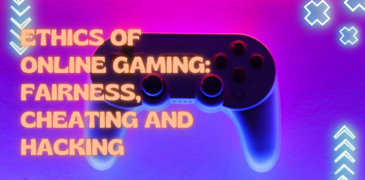Online gaming has become a popular form of entertainment worldwide. With an abundance of immersive multiplayer games and competitive esports tournaments, players can demonstrate their skills and engage with others from various parts of the globe. Nevertheless, ethical considerations are an inherent aspect of online gaming, just like any other human activity, and should not be overlooked.
Fairness is a paramount ethical concern in online gaming. Participants anticipate an equitable environment where each adheres to the same regulations and has an equal prospect of success. However, what occurs when certain players cheat or utilize hacks to obtain an unjust advantage? The surge of cheating and hacking in online gaming has incited fervent discussions regarding the moral consequences of such actions. While some maintain that cheating is an integral part of the game and that those who use hacks exhibit greater proficiency, others argue that cheating corrodes the game’s integrity and diminishes the enjoyment for all involved.
In addition, the morality of online gaming provokes inquiries regarding the accountability of game developers and publishers. Are they obligated to thwart cheating and hacking, or is it the responsibility of the players to self-regulate? Certain individuals propose that game companies should allocate more resources towards anti-cheat technologies and penalties to deter cheating. Meanwhile, others argue that such measures could be intrusive and compromise players’ privacy.
This article explores the ethics associated with online gaming, covering issues such as fairness, cheating, and hacking. We will examine varying perspectives on these topics and assess plausible solutions that game companies and players can adopt to encourage ethical behavior. Our primary aim is to elucidate this intricate and controversial subject and foster constructive discourse among gamers, developers, and the wider community.
Fairness
Equity is a crucial component of the online gaming realm. Gamers anticipate that each participant adheres to identical regulations and has an equal opportunity to triumph. Nevertheless, certain players resort to cheats or hacks to gain an unjust advantage, which sabotages the game’s integrity and can mar the experience for all. There are several approaches that game developers and publishers can employ to encourage fairness in online gaming, such as:
- Integrating stringent anti-cheating mechanisms that identify and penalize wrongdoers.
- Establishing a reporting mechanism that enables gamers to flag dubious activities.
- Urging players to embrace a fair-play code of conduct.
Cheating
Cheating is a highly disputed matter in the realm of online gaming. While some assert that using hacks and cheats is an integral part of the game and can indicate superior skill, others argue that it compromises the game’s authenticity and ruins the gameplay for all. Several typical modes of cheating in online gaming encompass:
- Aimbotting: The use of software that automatically aims and shoots at enemies.
- Wallhacking: The use of software that allows players to see through walls and other obstacles.
- Exploiting bugs: The use of game bugs to gain an unfair advantage.
Hacking
Another grave concern in online gaming is hacking, which entails exploiting software or tools to obtain unauthorized entry into game servers or player accounts. This can result in a range of fraudulent activities, including the pilferage of virtual items, identity theft, and more. Moreover, hacking can give rise to other malevolent conduct, such as denial of service attacks and phishing scams. To curb hacking, game companies can take the following measures:
- Implementing strong security measures to protect game servers and player accounts.
- Educating players on how to protect their accounts from hacking attempts.
- Monitoring the game environment for signs of hacking activity.
Responsibility of Game Developers and Publishers
One of the controversial topics in online gaming is the accountability of game developers and publishers in promoting ethical conduct. Some argue that these companies should invest in anti-cheat technologies and penalties to deter cheating and hacking, while others raise privacy concerns. To promote ethical behavior in online gaming, game developers and publishers can take various approaches, such as:
- Educating players on the importance of fair play and responsible behavior.
- Creating a code of conduct that outlines ethical standards for players to follow.
- Implementing strong security measures to protect game servers and player accounts.
Also read:
Role of Social Media in Online Gaming Communities
Future of Online Gaming: Virtual Reality, Augmented Reality, and Cloud Gaming
7 Unique Design Tips for Your Gaming Room
Tips To Choose The Best Online Games
FAQs
What is fairness in online gaming?
Online gaming fairness is based on the principle that all players should have an equal chance to win or succeed in the game, meaning that the game rules should be explicit and uniformly enforced, and all players should have equal access to resources and information.
What is cheating in online gaming?
Cheating in online gaming refers to any action taken by a player that gives them an unfair advantage over other players. This can include using hacks or cheats, exploiting glitches in the game, or colluding with other players to gain an advantage.
Why is cheating unethical in online gaming?
Cheating in online gaming is viewed as unethical as it goes against the core values of fairness and respect towards others. It creates an imbalanced gaming environment that unfairly benefits the cheater, leading to a negative impact on the experience of other players and compromising the integrity of the game.
What is hacking in online gaming?
Hacking in online gaming pertains to any effort to illicitly access the game’s servers or code, such as using tools to circumvent security measures or exploit vulnerabilities in the game’s software.
Why is hacking unethical in online gaming?
Hacking in online gaming is deemed unethical as it goes against the principles of fair play and respect for game developers and other players. It can cause server disruptions, loss of player data, and jeopardize the game’s integrity.
What are some common types of hacks used in online gaming?
Some frequently encountered hacks in online gaming comprise aimbots, wallhacks, speed hacks, and teleportation hacks. These hacks grant players an uneven advantage by enabling them to see through walls, move quicker than other players, or aim with greater accuracy.
Conclusion
To sum up, online gaming ethics present a complicated and diverse set of concerns. Game developers and publishers must address various issues such as impartiality, illicit conduct, and breaches of security while designing and managing online games. The game companies can uphold ethical principles and enforce rigorous anti-cheat and security measures to ensure a pleasant and equitable gaming environment for all players. However, the obligation to behave ethically in online gaming is shared among all players, and each person must take responsibility for their conduct and guarantee that they are playing in a conscientious and ethical way.







